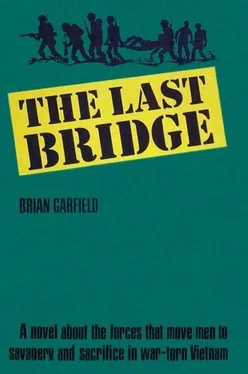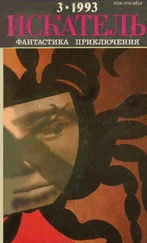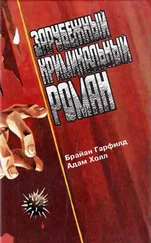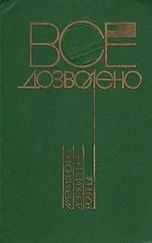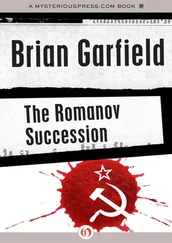Tyreen nodded to the others and crossed the tracks. He took a post, hidden in a thicket of bamboo, and waited for the others to join him. “Relax. Smoke if you want. Hooker, check your equipment.”
George McKuen’s sudden grin was a spasm of clenched teeth and drawn lips. “This time,” he said, “I’ll see that bridge smashed to bloody hell, or know the reason why.”
Chapter Forty-seven
1050 Hours
The train reached its sliding halt with a sigh of brake shoes. Smoke chuffed from the engine stack, and Tyreen saw the inscription on one slat-sided boxcar: Hommes 52–56, Chevaux 12. The train curved away into the jungle; its rear end was out of sight. Faintly, over exhalations of steam, Tyreen heard Sergeant Khang on the far side of the train talking to the engineer. The engineer and the fireman and the armed guard all crowded over to the far side of the engine to talk to Khang. Tyreen made a brief hand signal and stepped out of the bamboo.
He crossed the five-yard distance with rapid strides and followed Saville up into the engine cab. Saville had his gun braced on his hip. The tone of Khang’s voice changed, and the engine guard stiffened. Saville spoke calmly in Vietnamese and reached around to relieve the guard of his weapon.
Hooker and McKuen climbed up. Sergeant Khang looked both ways along the track and swung up. He said, “Take on water and proceed. We are not here. You understand?” He was talking to the engine driver.
The engineer was a middle-aged man with watery eyes and sloping chin. He blinked rapidly. His face was whipped red by wind. Tyreen’s gun muzzle lifted to cover the crew. The fireman was a hard chunk of a man with a keen, violent temper mirrored in his face. George McKuen said, “I’m thinking we’ll be doing our own coal-shoveling before this ride’s over, Colonel.”
“Watch him,” Tyreen agreed.
J. D. Hooker crouched down to lay out his equipment. Tyreen braced himself on the tender platform, giving Hooker room to work. Tyreen said, “All right, Theodore.”
Saville dropped off the engine and trotted back alongside the train. Sergeant Khang tied the sentry with his own belt and bootlaces. The man spoke bitterly.
The fireman rammed his shovel into the tender’s coal with a blow that could sever a man’s body. Sergeant Khang spoke a mild command; the engineer reached for his throttle. His tongue licked out rapidly.
Air brakes wheezed, and the big wheels spun before they took a grip on the tracks. The engine ground forward. Back half the length of the train, Theodore Saville reached for a boxcar ladder and swung up as the car rolled past. Saville swarmed up to the top of the car and ran back along the swaying catwalks. Tyreen lost sight of him around the curve in the track.
McKuen said, “The good Captain’s one landmark I didn’t expect to raise again. What happens if he has to fight a duel with an antiaircraft gun?”
Hooker made a pattern of tamping jelly, explosive blocks, wires and fuses and caps. Sergeant Khang bent down and rolled the trussed guard off the train. The guard’s angry shouting followed them. Wheel-trucks chattered on the rails. A red blaze glared in the open firebox, shining on Hooker’s face. Like a young spider, he seemed to thrive on the oppressive heat. The roadbed traveled a soggy, uneven course through jungle corridors. The engineer clutched his throttle; his eyes drained, and he stared petulantly straight ahead past the boiler.
A demolition cap rolled with the motion of the engine, and Hooker made a grab for it. The fireman’s quick eyes did not miss that; his powerful grip tightened on the coal spade. Iron wheels drummed on rail-splices, gathering speed. Tyreen spoke to Nguyen Khang: “Tell him to keep his speed down.”
Khang yelled in the engineer’s ear. The engineer answered quickly, resentfully. Khang stepped back and bellowed above the noise: “He says we got to have speed to make it up the grade.”
“All right. Hooker?”
“I’ll get it done,” said Hooker without looking up.
“Shape your charge to direct the force straight down. We want to blow the bridge, not the roof of the engine.”
“By God, don’t you think I know that much?”
Hooker worked on his knees with professional deliberation. When the fireman’s full shovel of coal passed by his face, Hooker hardly blinked; his concentration was complete.
The train made a thirty-five-mile clip. Branches sprang off the cab. Tyreen could see the engine’s weight depressing the ties on their soft bedding. The shoulders of the lower gorge rolled toward them, and the tracks swung away from the river and started their turn into the upgrade. The heavy smell of the jungle developed a sting from the added bite of coal smoke and intense dry heat. There was one length of straight track, curving upward in a bow. When Tyreen searched the length of the train, he found no sign of Saville.
McKuen said, “I don’t see any antiaircraft car.”
“Maybe.”
“Could be the beggars haven’t got enough of them to go around. Anyhow, we can always hope.”
Tyreen’s hope was that a low-hanging limb had not swept Saville off the train. The firebox guttered raw scarlet light across the cab. The train clicked along; the engine, fighting a stiffening grade, began to lose speed. Couplings crackled in brittle strain. Tyreen shifted his weary grip on the gun. “Four or five minutes, Hooker.”
The fireman rammed his shovel into the tender. His tongue licked a thin line across his soot-dark lips. Tyreen turned his attention momentarily to the engineer. That was when the fireman turned with a full shovel of coal and sprang catlike at J. D. Hooker. Hooker somehow felt the threat; he pulled up a shoulder and launched himself forward under the swing of the shovel. Before Tyreen could move, Hooker’s head butted the fireman’s belly and the fireman sailed back. The shovel dropped loosely across Hooker’s back. The fireman dropped out of the cab and kept himself on board only by the precarious grip of one hand against the handrail. Sergeant Khang whipped around; McKuen lifted his gun. Tyreen, who was closest, deliberately stepped in front of McKuen’s gun. For one moment he locked glances with the fireman. The fireman shouted at him. Tyreen slammed the side of his gun barrel savagely against the fireman’s knuckles. It broke the fireman’s hold. He fell away backwards. His cry was brief; he plunged down the embankment, striking on one shoulder. His head rolled loosely. He rolled to the bottom, and his shape receded along the train.
Cascading lumps of coal left a checkerboard of charcoal stains on the back of J. D. Hooker’s field jacket. Hooker scooped up the coal shovel and rammed it into Khang’s hands. “Work, damn you.” Hooker dropped back to his destructive tools as if there had been no interruption.
McKuen spoke weary relief. Tyreen beckoned him close and said, “Can you run this engine?”
McKuen considered it. “Looks easy enough. If I don’t have to turn loop-the-loops.”
Tyreen stepped past Hooker and shook the engineer’s shoulder. He said in Vietnamese, “Jump.”
The engineer jerked back. “ Choi oi! ”
“ Di nhanh, ” Tyreen said. “ Di di. ”
He gripped the engineer’s collar and propelled him to the open platform. The engineer gripped the handrails with both hands and bent his knees like a diver. “ Da dao my, ” he said with bravado, and leaped away.
Tyreen watched him tumble. McKuen grasped the throttle and looked back. “Is he all right?”
“I think so.”
“What was that last crack?”
“He said, ‘Down with America,’” Tyreen answered drily.
Sergeant Khang tossed coal into the firebox. The train howled up the long curving grade with a clang of steel and a banner of smoke. The slope tilted up, ever more steep, and the ten-wheel engine slugged laboriously along the line. McKuen said, “Maybe we’re supposed to give a whistle signal when we get up near the bridge.”
Читать дальше
